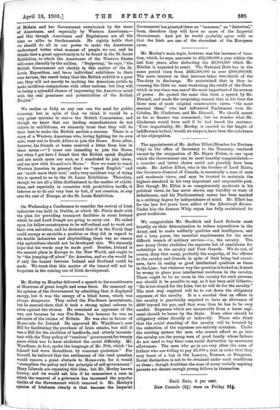Mr. Morley on Monday delivered a speech to his constituents
at Montrose of great length and some force. He summed up his opinion of the Government by admitting that it displayed energy, but it was the energy of a blind horse, which was always dangerous. They called the Pro-Boers invertebrate, but he assured them that it took a strong spinal column to swim against the stream. He remained an oppcnent of the war, not because he was Pro-Boer, but because he was an advocate of the claims of Britain. He was also in favour of Home-rule for Ireland. He approved Mr. Wyndham's new Bill for facilitating the purchase of Irish estates, but still it was a Bill for the abolition of landlords, and utterly inconsis- tent with the Tory policy of "resolute" government for twenty years which was to have abolished the social difficulty. Mr. Wyndham, in fact, spoke the language of Mr. Pitt, which "he himself had worn threadbare by constant quotation." For himself, he believed that the settlement of the land question would remove a great obstacle to Home-rule, for it would "strengthen the policy and the principle of self-government." Many Liberals are repeating this idea; but Mr. Morley knows history, and we would ask him if he remembers a case in which the removal of a grievance has increased the popular dislike of the Government which removed it. Mr. Morley's opinion of Irishmen clearly is that because the Imperial Government has granted them an "immense," an "historical," boon, therefore they will have no more of the Imperial Government. And yet he would probably agree with us that the Irish are one of the shrewdest of the European races.






































 Previous page
Previous page